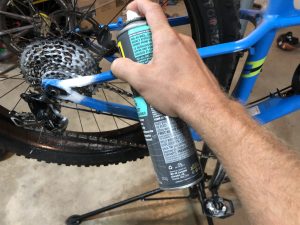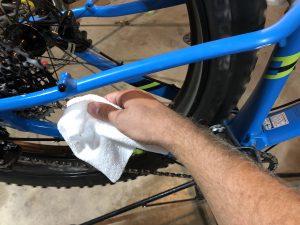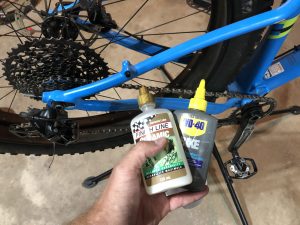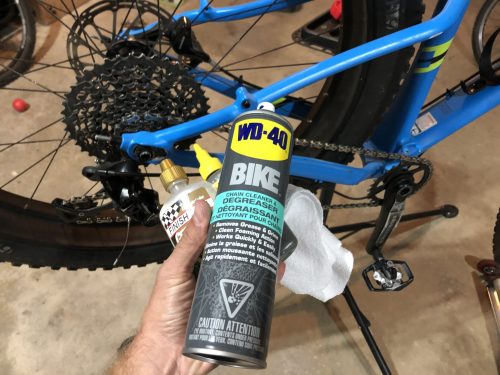At an early age, most people understand the importance of adding lube to the bicycle chain. Without proper lubrication, it can be tough on the bike as far as performance and even looks are concerned.
It is a pretty straightforward process overall, but one that everyone should know whenever they invest in a bike. Usually, lube is needed a bit more frequently for mountain bikes and fat bikes. However, adding lube can benefit any type of bike if it seems to be slowing down and not moving as it should in the bike chain area.
Regular Cleaning

The normal cleaning process is pretty straightforward, and a person should be following a set routine each time. If done correctly, it is only going to take a few minutes, and it will make a world of difference as far as performance and overall bike health are concerned.
The first thing to do is to look at the entire chain as closely as possible. Either flip it over, crouch down, or simply pick up the rear of the bike to get a close look.
Make sure to rotate the pedal to see how everything is operating. Pay close attention to each chain link because there could be buildup in only a few areas.

Not only will visuals tell the story, but listen for any type of issue as well. If there is any build-up whatsoever, there will be some squeaking even when doing some light peddling.
It becomes more and more of a distraction the longer it goes on, so people should be looking for a way to get that fixed as quickly as possible.
Spot Cleaning Options on the Chain
Sometimes, one particular area on the chain requires a quick spot clean. Maybe it is randomly picked up some grime, or it is starting to rust in a specific area. It usually needs particular attention, so adding a lubricant to the bike chain is the way to go.
The first step is to brush out that part of the chain-link with any type of firm brush. If a specific chain brush is not purchased, another option is just simply to use a toothbrush.
Remember that after brushing that part of the chain, it loses some of its lubrication. Relubricate the links so that everything operates smoothly.
Leaving too much lubricant on is not really too much of an issue, but it is usually recommended to wipe off things if it is distracting.
Otherwise, the extra lube will just end up on the side of your leg while riding. The new lubricants do an excellent job of not attracting new dirt, but some of the older options are actually counterproductive if there is too much on the bike.
Everything can be done with some lubricant and basic household items. Some will invest in a real chain-link cleaning tool so that they get every last bit of the setup cleaned off. This usually provides a better deep clean, but it is not like it is going to make that much of a difference for most.
Regular and spot cleaning frequency

It is hard to provide a 100% accurate recommendation for anyone who is cleaning off the bike. The more often the bike is taken out, the more lubricant that is needed consistently.
Most believe it makes the most sense to simply take a look and listen to feedback from the chain. Doing this at least once a week will give people a pretty good idea of how often they should be taking the time to clean and lubricate.
It might be much more frequently after tough rides, but most end up developing some type of system.
Thoroughly Cleaning the Chain Off the Bike

A few times each year, it is recommended to take the chain off of the bike completely. This allows for a full brushing and cleaning of the chain to remove some of that hard to reach build up and grime.
If possible, let the chain soak for a while until the dirt starts to fall off. This is when it is time to dry the chain off and remove any of the solvents if it does not evaporate. Lubricate the chain, and then it is ready to go for a long ride.
Only cleaning the chain when it is on the bike is going to prevent a person from fully reaching everything. It becomes tough to reach every single part of the chain when trying to work around so many other parts.
What To Look For In a Great Lubricant

Top 5 Best Wet Bicycle Chain Lube – 2020
A chain lubricant might seem pretty basic as far as tools and accessories are concerned, but there is some variance. When shopping, make sure to look for a lubricant that not only minimizes the accumulation of dirt but is also durable enough to stay on the chain for a while.
It might not seem like that much of a hassle to leave the chain frequently, but having a durable option is certainly beneficial if someone ends up forgetting.
Technically speaking, a person should only be looking at bicycle chain lubricants in today’s world. There used to be a time when relying on general lubricants was perfectly fine, but they are now formulated precisely for the needs of the trails. That means staying away from something like WD-40, as it is more of a general cleaner instead of an actual bike lubricant.
What Type Of Lube is Best?
Lubricants are so advanced now that there are different types out there for different conditions. Dry lube is known for being a pretty light consistency that goes on wet. When it dries, it is a more protective layer that fights off dirt collection pretty well. It is not the best for extreme conditions like mud and wet weather, but that is what a wet lube is for.
Every single wet lube is a stickier option that pretty much acts like a water repellant. They last longer than dry options, but it does tend to make a chain dirtier.
Instead of going with one extreme or the other, there is some middle of the road options available for those who want a more versatile lubricant. Some people will switch lubricants depending on the time of year, which does make a decent amount of sense.
Does a Brand New Chain Need Lube Added?
A brand new chain is going to come packaged with some lubricant on it already. Therefore, unless it is bone dry, it does not need any extra lube added once it is put on. In fact, a lot of people end up using a rag to remove some of the excess lubricants, since new chains ship with quite a bit. It is really not too big of a deal, but keep that in mind if it seems like too much.
If it is a brand new chain on a brand new bike, the shop will make sure that the chain has lubricant on it. If, for some reason, it comes without lubricant on it, simply ask before leaving the store.
Dealing With Common Problems
Whenever it is time to clean up a chain, some common problems pop up. Instead of worrying about them right away, it is better to understand just what to do with everything so that the problem does not persist.
Links that are too tight
Every link on the chain needs to be able to bend smoothly. If they do not, it can really hurt the efficiency of the chain in general. To spot some of the tighter links, pedal the chain slowly backward and watch to see how it operate. When each link passes through the turns of the rear derailleur, most people will be able to really start to understand.
What causes these links to be too tight? Most of it comes down to a buildup of dirt or corrosion between the plates. The quickest way to fix that is to do a thorough cleaning, lubricating the chain and moving it around back-and-forth.
There are also cases in which a link is too tight because the pin installation was not done correctly. There is a pin that holds the chain links together, and if it is not inserted all the way, it can mess everything up.
If it seems like the chain is not linked properly with pins, try to work it back into position by putting them back and forth inside to chain planes. There are chain tools that can be used for this, but the hands are also perfectly fine. If the chain can’t be saved, it needs fully replaced.
Stretched out chain
The older a chain is, the more likely it is to be completely stretched out. They become longer over time, even though they do not actually stretch as one would think. It appears longer because there are wear and tear between the rollers and the links.
Gears will start to skip because of this slop in the chain area. A chain that is stretched out also wears down the chainring and the rear cog teeth a bit more as well.
At the end of the day, replacing a chain is annoying. However, it is much easier to do than replacing an entire cogs set. Take care of a stretched out chain first before it becomes a bigger issue.
Final Thoughts on Lubricants
Lubricant definitely makes sense for anybody who rides a bike and also wants to make sure that they keep everything operating as it should. The last thing anyone should be trying to do is put themselves in a vulnerable situation because they are skimping on adding a lubricant. It’s one of the worst things a person can do that might not burn someone right away, but it eventually starts
to add up. A high-quality fat bike chain is decently expensive, but the good news is that they are very durable as well.
Think of it as part of the presentation process, as well as functionality. If the bike looks like it is dirty all over the frame, the chain probably needs some focus as well. Do not ignore something that needs to be done and only takes such a short amount of time.

